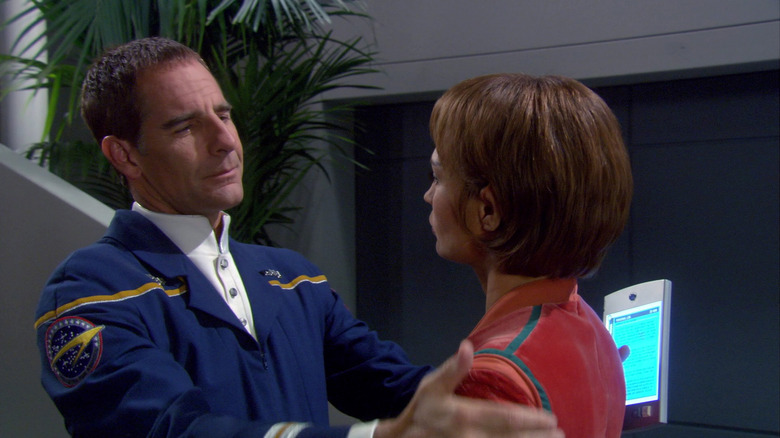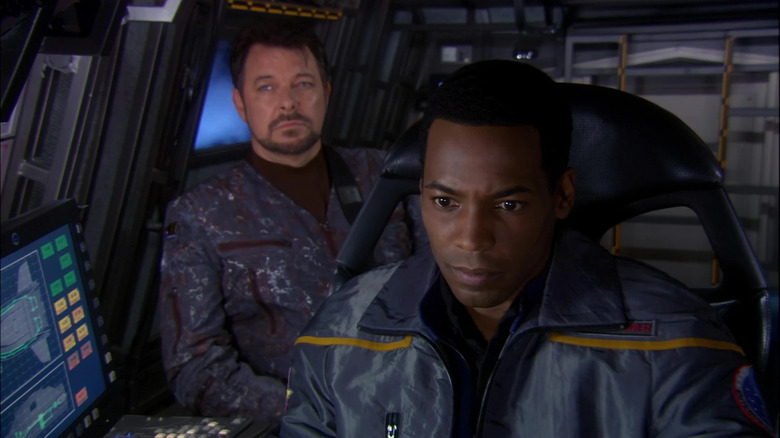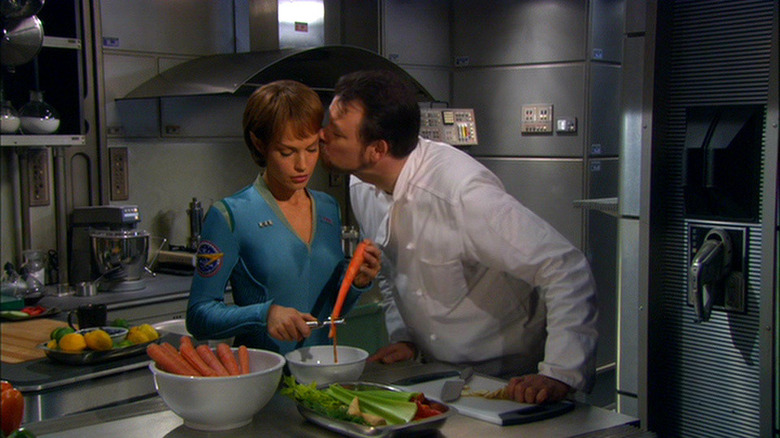Star Trek Enterprise's Scott Bakula Wasn't Thrilled With The Series Finale
The final episode of "Star Trek: Enterprise" — titled "These Are the Voyages..." — aired on May 13, 2005, and it looked like the long road of "Star Trek" had finally come to an end. "Enterprise" debuted only two weeks after 9/11, and the world, it seemed, was no longer in the mood for the franchise's optimistic messages about diplomacy and peace. "Star Trek" encouraged people to reach out to enemies and find common ground while the pop world was singing "We'll put a boot in your ass, it's the American way." By 2005, the franchise's time was finally near.
Yet, as the property limped out the door, fans were presented with a disappointing series finale wherein all the show's loose ends had to be wrapped up in a hurry. To achieve this, the "Enterprise" showrunners conceived a crossover event wherein Commander Riker (Jonathan Frakes) and Counselor Troi (Marina Sirtis) from "Star Trek: The Next Generation" recreated the "Enterprise" characters on a holodeck. Recall that "Next Generation" takes place about 220 years after "Enterprise," so audiences weren't even seeing the "real" versions of Captain Archer (Scott Bakula), T'Pol (Jolene Blalock), et al closing out their journey. Instead, Riker enjoyed recreations of them for his own personal edification. There was no notable Trekkie thrill in seeing Riker interact with Archer.
One can see why the "Enterprise" showrunners wanted to end the series in this fashion: it was a great way to connect "Enterprise" to extant "Star Trek" lore. Fans, however, were frustrated. This is the way "Star Trek" ends — not with a bang, but a holodeck recreation.
In 2010, Bakula was interviewed by StarTrek.com to gauge the actor's views on "Enterprise" after it had been off the air for five years. It seems that he was just as disappointed with "Voyages..." as everyone else.
These Are the Voyages of the Starship Disappointment
Even after several years, Bakula remained diplomatic. "These Are the Voyages..." was written by longtime "Star Trek" producer Rick Berman and just-as-longtime writer Brannon Braga, both veterans from the early days of "Next Generation" and co-creators of "Enterprise." Bakula recalled reading their teleplay for the "Enterprise" finale and having to have a meeting with his bosses, more or less asking for an explanation:
"I have to say that when I first read the script I was off-put by it. I had a long talk with Rick and Brannon about it and they explained their idea and philosophy to me. I don't know that I ever ... Gosh, the end of anything is always hard to write. It was a little odd, but that was their call."
Bakula's trailing off indicates that he was poised to say something perhaps slightly more acidic, but then caught himself, not wanting to badmouth a plum gig he held for four years.
The general wisdom among Trekkies is that "Enterprise" struggled through its first two seasons — which were presented in a traditional "story of the week" format — and then picked up considerably for its third and fourth seasons (which relied more heavily on extended, multiple-episode arcs, which were more fashionable at the time). The third season devoted all 24 of its episodes to a time-travel-based conflict with a mysterious species called the Xindi who randomly destroyed Florida without provocation, with the series' leads tracking down the Xindi and wondering why they attacked.
Bakula, it seems, didn't like the "extended arc" approach, nor the warlike attitude the series had to affect to achieve it.
Star Trek in a post-9/11 world
/Film has previously written about how "Enterprise" suffered from being produced in a post-9/11 world, and it seems that Bakula was starkly aware of that same phenomenon. The showrunners, it appears, wanted to make a "Star Trek" show that reflected the darkness and war of the real world, yet Bakula felt that robbed "Enterprise" of its potential to be, y'know, enjoyable.
Notably, Captain Archer's arc changed. At the beginning of the series, he was a cautiously optimistic astronaut who had to grow into a mature diplomat. With season 3, however, Archer became angry, violent, and even weirdly amoral. To Bakula, this was a regression for the character. Had "Enterprise" continued, the actor admitted he had wanted his character to mature past the violence and get back to the whole diplomacy arc:
"Things were dictated by the times, by it being post-9/11. But I wanted us to hopefully get back to having a little bit more fun on the show and to get out of that whole Xindi thing. That would have been fun. I think we were pointing in that direction. I think the group was ready to go. The cast was ready to get there, and I think we could have had a blast. But we just didn't get to go there. And I wanted Archer to kind of grow up and lighten up a little bit."
Ultimately, "Enterprise" might have been "too little, too late" in the world of "Star Trek." Audiences had retreated, the world had changed, and an 18-year hot streak was coming to an end. "These Are the Voyages..." was merely the lock turning in the door as everyone exited the theater.
"Star Trek" wouldn't return to television until 2017.


